Rick Wayne's Blog, page 36
October 13, 2019
Folio from Russian artist Timofey Stepanov’s “Story of t...
[image error]
Folio from Russian artist Timofey Stepanov’s “Story of the Fallen Sun.” Find more and support the artist on his ArtStation page.
October 12, 2019
(Art) The Fantastical Photo-fantasy of Alexandra Bach
[image error]
French digital artist Alexandra Bach makes fantastical photo manipulations. Find more on her ArtStation page.



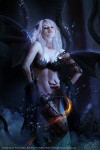
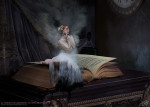
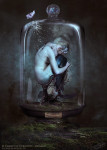
October 9, 2019
(Fiction) The White Raven
[image error]
The white raven flew down a little street that ran along the far side of the shopping center and landed on a low sign that said: Midnight Gardens Mobile Home Community. There wasn’t any pavement. Just a dirt driveway with gravel and puddles. His name was written in marker on a white strip on the door of unit number five. It wasn’t Mr. A. Tranjay. It was spelled E-T-R-A-N-G-E-R. I felt stupid. Like a dumb kid who couldn’t even spell right. Like there was no way I could ever stop my secret from hurting anyone else and I should just give up and go home and go to the doctor and not try to be the good kind of bad anymore but just the regular kind like all the other kids.
I sniffed. It was cold and my nose was running. I reached in my pocket for tissues. Dad was a good packer. I wished he could have come with me. Someone had spray-painted red symbols on the ground all around. They were just like the ones on my window. The raven stood on a yellow plastic mailbox full of colorful junk mail. She called. She was a big bird. It was loud.
I was about to turn around and go home when the door opened.
And there he stood. He was worse than before. A lot worse. He was dressed in sweatpants. He had a cane. He couldn’t hold it still. He could barely stand.
I looked up at him. “It has a little boy named Trevor in kindergarten who likes ice cream and doesn’t say his S’s right.”
He looked at me. He looked at the raven on the mailbox.
She called again, softer.
“I thought you weren’t getting involved,” he said with his head lowered. He wasn’t talking to me.
But the raven just flapped her wings and flew away.
Mr. Étranger watched her fly into the night. He turned to me.
“Do you know her?” I sniffed. My cheeks were red from running in the cold. I could hear a semi pass on the big freeway down by McDonald’s.
“We were lovers. For a while. You’d better come in. There won’t be much time.”
“What’s a lover?” I asked.
I walked in and he shut the door. There was flat carpet, the kind that people get when they’re afraid kids will spill stuff on it, and fake wood on the walls. There wasn’t any TV or anything. Just a single bed with a table next to it. And one lamp. There were boxes all around, just like the one with his books in it. Most of them were empty. Everything smelled like old cheese.
“The raven is her voice.” He shuffled past me toward the bed, which rested at an angle in the living room. “A herald or messenger.” He tossed the cane onto it and laid down.
“Is that why it’s white?”
“Once all ravens were white.”
“Really?”
“Oh, yes,” he nodded. “And they sang beautiful birdsong. Like a thrush. Or a nightingale.”
“What happened?” I asked as he draped his arm over his eyes, like maybe the light was bothering him.
“Mankind angered the gods,” he sighed weakly, “who took away man’s fire in punishment. The world grew cold. Winter came, and men starved. Feeling pity, the earth mother asked raven, the trickster and thief, to fly to the abode of the gods and steal back fire for man.”
“Did she?”
“Oh, yes. Raven was a trickster. And a thief. She knew all the secret places. And on the long journey back to earth, carrying burning coal in her beak and breathing its smoke, raven’s white plumes turned dark with soot, and her once beautiful voice grew hoarse. So it is the ravens of earth are black as soon and have a crooked cry.”
“Oh.”
He took a long breath and let it out, as if he wanted to sleep. His breathing was heavy. I watched it. I saw the little totem pole on the table. The two pieces at the top were still blank. I looked at the kitchen, which was open to the living area. It didn’t seem like he had any food.
“How come you won’t eat?”
“I did something. Long ago. And I am trying very hard to make amends.”
“Mends?” He closed his eyes and I took a better look at him. He was so skinny I could see the skin of his neck throb with each heartbeat. “Is it working?”
He chuckled. “Like with all great sacrifices, I won’t ever know.”
I think that meant he had to die for it to work.
“Maybe I could help instead.”
He smiled at me. “You’re a good boy. And I have appreciated your company. More than you know. But you have enough to deal with, I think.” He raised himself up in the bed with a groan. “It’s an apparition. Your secret. A fear-eater. People think it haunts closets and the spaces under our beds, but what it truly haunts is our minds. We simply project our fears into those other places. And it is that which sustains it.”
He took a deep breath, held it, and let it out slow. His hands were shaking.
“Like a bogeyman?”
“Yes. That’s it exactly.” He was wheezing. “It is a bogeyman.”
excerpt from the conclusion of my epic occult mystery, FEAST OF SHADOWS. Part One available now!
October 8, 2019
Giorgio de Chirico — The Mute Orpheus (1970)
[image error]
Giorgio de Chirico — The Mute Orpheus (1970)
October 6, 2019
(Art) The Culture of Self-Deception
[image error]
I’ve written before about how the collage, once banished to kindergarten art class, made a comeback as a serious (if ironic) art form in the 2000s. I argued that this was primarily driven by technology, which, in preserving the detritus of the past and serving it up to us regularly via the internet, has made us aware that we are nothing if not a culture of excess. (See also Moon Patrol.)
A newer but related trend is the remix, where one takes old art and re-purposes it. The simple version starts with the same kind of detritus as collage — prints or magazines or thrift store paintings — and physically modifies them, as in Chris McMahon and Thyrza Segal‘s monster series. (Click for a larger image.)

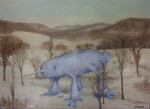
The more complex form digitally modifies classical works of art, usually by adding a contrasting motif, something that doesn’t fit, such as the android in DeviantArt-ist Shorra’s remix of William-Adolphe Bouguereau’s 1888 painting “The First Mourning,” or the headless woman in Robin Isely’s remix of Charles Joshua Chaplin’s “Reflection” (below), in which a young woman examines herself in a mirror.
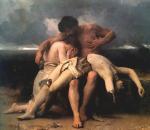

Unless you’ve studied art, you probably haven’t seen the originals, which is important. To remix the Mona Lisa, for example, as countless commercials and advertisements have, is to remix a living symbol. Certainly, we don’t relate to it as the artist imagined. It is not living as it was when painted. It exists now only as a symbol of art par excellence, but it does exist.
To most of us, the paintings above are nameless. They represent “bygone times” rather than any specific era or message, which is now lost on us. Thus, what the modern artists are remixing is not the painting or its content but our conception of the past, so creating an entirely new message: that we here in the future are broken.
Note how the new subjects of these paintings are, first, inhuman, and second, not alive in any meaningful sense. These works are part of the larger cult of decline, which I have also written about before. Never mind that the world has supposedly been on the edge of collapse for hundreds of years, as with the return of Christ, every generation is ready to believe it’s immanent all the same.
The new genre of the classical remix tells us that our culture is “broken,” that its deranged from its beautiful if somewhat bland and boring origin. But then, nostalgia is like pastoralism. We don’t want to live under the norms and restrictions of the past any more than we want to live in a pre-industrial country herding sheep and living in a hut. But since we believe those modes of life are more authentic and virtuous than ours, neither do we want them to die. We want someone else to live them on our behalf so we can keep watching Netflix.
But arguably the most important aspect of these works are that they’re a part of the very spectacle they criticize. We’re not meant to be horrified by Isely’s serenely headless woman any more than we’re meant to be alarmed by our own derangement. Indeed, we’re to laugh or marvel at it. In that way, these images announce the debasement of modern culture while at the same time participating in that debasement.
October 4, 2019
(Art) The Fantastic Characters of Ben Juniu
[image error]
Ben Juniu certainly has a penchant for character design in a dark palette. Find some inspiration for your next novel or game.


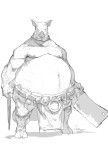






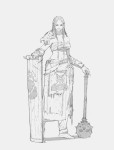




September 30, 2019
New work by David Seidman, previously featured on the blog.
September 29, 2019
(Fiction) The Door
[image error]
Except for the frame, it looked the same as any other door in the building, with one addition. At the apex of the frame, a minotaur’s head had been etched into the metal. The sign of the labyrinth.
When they were in power, The Masters had wanted to be able to send their agents anywhere in the world, especially to the important places where all the secrets were kept: the Kremlin, the Forbidden City, the Federal Reserve. They tended to install their doors in out-of-the-way places like storage closets and bathrooms to minimize the chances of their agents being seen as they came and went. No one pays much attention to a janitor going about his job.
With a few exceptions, each door could connect to any other, as long as one knew the correct ritual. And had a key.
Walter raised his hands. “Ready?”
I looked to the door again. There was no telling where we were headed. If I was going to get free, now was the time.
“You don’t have to do this.”
Walter held out his hand. “I’ll take that,” he said, motioning to my thief’s tool.
After a pause, where I contemplated my lack of options, I slapped it in his open hand. But instead of retracting my own, I pulled his at the wrist to unbalance him and knuckled his throat. He gagged as I raised my bare foot to knock his prosthetic leg out from under him, but I guessed wrong and connected with a very real, very muscular appendage that didn’t budge. He didn’t even grimace. I spun left, elbow raised, hoping to catch him in the nose again, which was already tender, but he was too strong and well-practiced. He deflected my blows, one after the next, or simply powered through them with his own. I took two head shots and one to the chest that forced me back. I feinted and spun again and tried to run past him on his left, but his arm swung out and caught me around the waist. He hoisted me and threw me against the wall. My shoulder caught the edge of the fire hose mount and I went down.
I shut my eyes a moment. “Ow . . .” I had to chuckle at my own stupidity.
“You’ve had training,” he said, half in appreciation.
“Not enough, apparently.”
“Don’t take it personally. You weigh like a hundred pounds.”
“A hundred and thirty,” I corrected.
He pulled me to my feet, where I immediately pulled the fire alarm next to me. The klaxon sounded.
“Fuck,” he cursed.
The guards would know exactly where to come. They would be there in seconds.
“Don’t take it personally,” I mimicked.
Walter grabbed my neck and punched me so hard in the stomach that I nearly puked, but not in retribution. It was to stun me. While I struggled for breath, he opened the door with the key and practically threw me through it, followed by Benjamin’s bones. I landed hard, coughing, on a smooth but uneven floor—not stone, but not wood or plastic or composite either. It was cool and felt like the inside of the heavy oyster shell soap dish in the bathroom of Huddleston House. It was dark there. No one waited to greet us. Walter grabbed his bag and shut the door hard behind him. The Master Key went in and turned once. The moment it did, the faint sound of the klaxon ceased and we were wrapped in silence. Anyone checking the door we had just walked through would find an empty closet or storage room.
Walter peered around in the dim light. He didn’t say “Where the hell are we?” but he may as well have. I’m sure my face wore the same look.
I could describe the room we found ourselves in as cavernous and vaguely egg-shaped with walls seemingly formed from flowing lava. I could say the door through which Walter and I had entered stood free in space, unconnected to any wall. I could note that a kind of spiral staircase hung over us, but that it turned like Möbius band rather than coiled like a strand of DNA. Whoever walked would be turned upside down.
Such an inventory would be factual but would omit everything of genuine significance. For one, the room was dead. By dead, I don’t mean lifeless. Any four walls are lifeless for the simple fact of having never been alive. This room was dead, and standing in it felt like standing inside the husk of roadkill left to bake hard in the summer sun. Only this roadkill was immense and standing in it made one feel like an insect.
I say “standing” for lack of any sensible alternative. We just as well may have been dangling. Besides that the room was dead, it was also upside down. I could feel something like the tug of gravity from from my head and was immediately gripped with the sensation of being turned the wrong way round. If Walter and I were standing, it was on the ceiling, which is an odd circumstance my brain had trouble parsing. Like those optical illusions where one can see a duck or a rabbit but not both at the same time, I could only be aware that I was upside down if I let go of the evidence from my eyes, which saw my feet planted as firmly next to the door as they had been planted anywhere. And so my mind flip-flopped dizzyingly, from right side up to wrong side down and back again, and I nearly fell. If I had, I suspect it would’ve been up, and that I would’ve careened off the stone staircase and cracked myself on whatever lay in the darkness at the far end.
In desperation, my eyes searched for some kind of fixed landmark and settled on the walls, which, unlike the staircase, were ambivalent about direction and so remained neutral on the question of up and down. But in fixing on them, I found it difficult to look away. Their dark curves and rivulets had an almost erotic undulation. At one time, they were like the smooth wrinkles that gather on the crust of cooling lava, but they were also like the tracks of a thousand giant sidewinders through a black desert, and again like a river of souls swirling around me in three dimensions. That’s what it was. Writhing souls. Whether it was from pleasure or pain, I couldn’t say, but featureless limbs and torsos, half-submerged and packed like logs, swirled endlessly down, down, down . . .
It seemed to me then that a mad and awful thing had secreted a great shell around itself and then died, and that we were inside its remains. The room certainly turned around itself like a mollusk’s shell, but where a nautilus dances beautifully around the Golden Mean, this place was unbalanced. Dizzy. Deranged.
As my quickened heart brought sweat from my palms, one final realization dawned.
I had been there before.
Not in that exact place, but somewhere in the vast, once-living structure of which it was part.
“No . . .” I breathed. “No, no, no. We have to get out of here. Walter, we need to leave.”
“Hold on,” he said, head craned upward in study. “I guess that’s the way down.” He pointed to the stairs, which, like the door, seemed to have been added later. I could guess by whom.
I went for the key but he grabbed my hand, and we struggled briefly.
“Careful,” he warned. “Lose your balance here and you’re liable to fall.”
He was right. Whatever held us to the ceiling did so just enough to keep us there. It was ready to let us go the moment it needed to. It seemed the place we were to go had been turned 180 degrees from the place we had been, and the staircase was our only bridge.
“No welcome wagon,” he said.
“I thought you said we were early.”
“Yeah.” He pointed to the floor. “And I think they’re counting on that to keep people out.”
I hadn’t noticed before, but there were concentric circles of binding runes painted in pale contrast on the floor—black on charcoal. Frenzied. Mad. Like the rest of that place. But with a kind of deadly elegance.
“So why didn’t it work?”
He made a face. “I sort of make magical bindings go haywire.”
So. That was it. That was how he had survived so long, and why his flesh was so valuable. He was a walking dispel. A finger, properly dried and worn about the neck, would be a powerful ward.
“After you.” He motioned to the stairs.
I looked up. Stepping onto them required something of a leap of faith as they were oriented perpendicular to the ceiling where we stood.
“Why me?”
“Because I don’t want you running off, Goldilocks.”
I took a deep breath. “Where would I run? This is the only way out.”
I stepped. Surprisingly, it felt no different than climbing any other high step.
Walter followed with a grunt. “You recognize this place, don’t you?”
“Yes,” I said, walking carefully, not daring to take my eyes from the steps.
“Not gonna tell me? What about our game?”
“You wouldn’t believe me. Or worse, you would and end up curious.”
“What’s that supposed to mean?”
“You’re a smart man, Walter. I can’t imagine you’ve stayed alive all this time without an abundance of caution. Look around you. Think. They know you have a key. Why would they invite you through the back door knowing you could return at any time?”
I was sure Walter was being double crossed. He was just as much a threat as I was. Even if he didn’t act against them, someone else might using his key. My enemies hadn’t hired him for his skill—or not only. They were cleaning house, and very efficiently. They were eliminating two threats and acquiring an asset all at the same time.
I glanced back to Benjamin’s bones, which Walter had left next to the door.
I think he got it. I think Walter Kilmagi understood the situation the moment we arrived. But whatever they had offered him, whatever vast sum or promise, was too difficult to let go on mere instinct. I suspect he had bet his future on it. We talk about magic as if it makes us do what we don’t want to, but I’ve found the reverse is true. Magic convinces us to do that which we were otherwise too scared—or rational—to contemplate. The secret desires of our heart. That’s how the saints could slough off its effects like water. They have nothing to corrupt.
The good news was Walter’s wits hadn’t left him entirely. He had left Benjamin’s bones by the door, which meant he at least contemplated the need for a hasty exit. He’d also retrieved a large brass vajra from his bag as we climbed. It was chipped and scratched from numerous battles. He held it backhand, street fighter style. “Noble” magicians were supposed to hold their wands and staffs before them and clearly enunciate their spells. Only mizzens and outlaws held their wands backhand or hid their distaffs under clothing, disguising their spells with verbal chicanery and sleight of hand.
He saw me noticing his grip. “I’m not sure if you realize it or not, lady, but this isn’t my first circus. Or the first time someone’s tried to get one over on me. I told you. I’m not an easy man to get around. I understand your beef with me, and that’s fair. But there’s nothing to be done about it now. Do as I say for a few more minutes and I won’t have to do something we’ll both regret.”
On the one hand, his bravado wasn’t completely unfounded. Even against numbers, Walter would have the edge. In group tactics, two or three magicians typically come with quick spells, one after the other, often in a precisely practiced sequence, while their more powerful comrades take time to prepare one or two heavier volleys. Because magic can penetrate walls and change the outcomes of reality, magical battles rarely last more than a few rounds and whoever takes the initiative usually wins.
This is where Walter’s unusual ability would be so crucial. Those quick early spells, meant to harass and confuse, would have diminished effect, effectively giving him the initiative in every encounter. He could then take out the big guns, locked in the middle of their incantations, thereby eliminating the threat that they might overcome his natural defenses. Indeed, he didn’t need to worry about casting defenses, which his attackers would be forced to do immediately upon seeing their first comrade fall. All he had to do was eliminate one or two more, or even just injure them, at which point even the hardiest of parties would almost certainly retreat, if only to reexamine their strategy.
There were risks, of course. But there were always risks. From Walter’s point of view, that was just part of the job.
But as much as all of that was true, I’m not sure Walter had ever had experience with black magic. Real black magic. The kind that Detective Chase found under the basement of the puzzle box house. The kind that built the labyrinth that ensnared the cleverest man I knew. The kind that came from the book—a tome recorded by Nebuchadnezzar but sung by the dark gods themselves.
I stopped just steps away from the landing, beyond which was a dark corridor. I could see nothing.
“This isn’t a mizzen turf war or a goblin with a grudge. Look at this place, Walter. Try to imagine what it was like when it was alive. Try to imagine the kind of power it takes to call something like this forth.”
“All I see is the husk of something that was important way back when. Whoever’s here now is counting on that to scare us. But those runes they put around the door.” He pointed up the impossible staircase to ceiling on which we had been standing. “They never had a chance of stopping someone like me. That tells me they don’t know what I can do, and that means I have the edge. I’m gonna get my money. You wanna wait here”—he stepped past me and hopped down to the floor—”go right ahead.”
I stepped down as well. I was going to follow him, but something in his word bothered me. Something about the runes. I glanced up at the ceiling. I saw the plastic bag with Benjamin’s bones resting next to the door. Encircling it were concentric sets of symbols. I could see them much more clearly there than when I was standing in the middle of them. We’d had it backwards. Just as with everything else in that place, the runes were upside down. There weren’t binding. They were summoning.
We were supposed to step through that door.
“Walter, I—” I turned and saw his feet twitching several inches off the ground. Something had him. Something that hadn’t been there a moment before. It held him effortlessly even as he struggled against it.
With gagging breath, he tossed the key. It bounced on the hard floor. The clang echoed. I stared at it.
In that moment, I knew several things. I knew that there were more of those things around me. I knew that because I knew they were the same things that had chased Cerise and Benjamin at the construction site. I recognized the straps. But they had still been partially human then. The thing that held Walter was deranged beyond recognition. And it was bigger.
Worse still, I knew why I couldn’t perceive them. I had seen that kind of magic before. I had lived with it, in fact, back in the war. Back when I was a spy for The Masters. Back when that ruin was alive.
I couldn’t run, I knew. But there was every chance one of them was waiting on the staircase for me to do just that. I couldn’t risk it. If I was captured, I would know only an infinity of pain.
Memories of my time in Whitechapel filled my mind and I panicked. I acted without conscious thought. I grabbed the key and jumped. I jumped up, which was also down.
And I fell.
But in my panic, I misjudged my launch and shattered my right pelvis against the staircase. The sound echoed, as did the slap of my chest as I hit the ceiling. I had successfully avoided cracking my skull, but I was in immense pain. My right leg, which was folded awkwardly behind me and which I didn’t dare look at, was clearly unable to support my weight, which meant I couldn’t walk. The right side of my chest was tight and it hurt both to move and to breathe, which I could only do in short gasps. What breath I could draw didn’t seem to go very far, which suggested that I had not only broken one or more ribs, but that one of them had punctured a lung, which was now filling with blood. And I had impaled myself with the key. Luckily, only to a depth of a few centimeters.
All of that was delivered to my brain instantly, but it was drowned sheer panic. I was aware that I was in pain but I was not in pain. Frantic, I dragged myself across the floor using my flat palm and the Master Key like grappling hooks and pushing with my one good leg. My mind was absent all higher thought and I audibly yelped in panic as I pushed and clawed my way to the door.
My fingers brushed the knob and I went down. I didn’t dare look back lest that single moment be the difference between life and a eternal damnation. I lunged again with a cry and pushed the key in. The door swung open with a single turn of the knob. I grabbed the bag with Benjamin’s bones and pulled it with me over the threshold. When I turned to shut the door behind me, I caught another flash. I saw hands, but what reached for me was more like a tendril capped in a fleshy pad. A pair of them erupted from the thing’s back. I screamed and slammed the door shut. The handle twisted as I flicked the lock and dropped to the ground.
I was back in Colorado. The fire alarm had stopped. The pain hit me then, as if whatever dam had kept it at bay had finally been breached. I vomited but barely took notice. There was every chance that my enemies had a key of their own. I used the gurney like a walker. It supported my weight on one side as I hopped to the fire station. My hand was already on the fire ax when heard the unmistakable staccato of a key sliding into a lock. I tossed the ax on the gurney and hobbled back to the door. I saw the handle turn hard as I lifted the ax. The door was opening. I screamed as I swung.
With a clang, the ax head split the minotaur head that had been stamped into the sheet metal frame. It hung there, wedged into the metal, as the door swung open on its momentum and hit the gurney.
But the spell had been broken, and there was nothing inside but a dark storage room. I collapsed, my body heaving in tears and pain.
After some time, I don’t know how long, I heard voices in the distance. They didn’t appear to be approaching, but they reminded me all the same that I still wasn’t safe. No doubt the base was on alert, looking for whoever had pulled the alarm. I looked at the clock on the wall. I less than 90 minutes.
“Get up, Mila.” I clenched my jaw. “Get up!”
I found a pair of fresh scrubs in the medical examiner’s work room. I removed a metal bar from one of the examination tables. It was affixed by adjustable vise and held a lamp aloft. I discarded the lamp arm and used the straight metal pole as a splint, which I bound tightly to my leg with surgical tape. I used the same kind of bar from the adjacent table as a cane. I could taste blood now, and it was getting very hard to breathe. Simply wrapping my leg in tape had felt like climbing ten flights of stairs. I was running out of time. Finding the morphine was easy. It was in the locked cabinet, which I broke with a chair. The noise eventually brought soldiers (who looked to me almost like children in uniform), but by then I was in the elevator.
This I was prepared for. This had always been the plan.
Still, even with the morphine, I could barely move, and it took me nearly an hour to reach the runway, barely three quarters of a mile away. A uniform had been left for me in some bushes, and it allowed me to cover short distances in the open without drawing attention to myself. There was supposed to be a vehicle behind the administrative services building, but it looked like everything was being cleared in the search.
Everything, that is, except for the General’s golf cart, which I commandeered.
By the time I found my contact in a large flight hangar, pacing nervously before a row of long crates, I was in a great deal of pain and sweating profusely. He turned sharply when he heard the hobbled gait of my approach. I was breathing hard and my hasty bandages had come open. I was bleeding through my clothes, which I clutched to myself.
“Jesus,” he said when he saw me.
His hair was neat. His skin had the earthen hue of an American native. His last name was printed neatly on the breast of his monochrome blue uniform: TENFEATHERS.
“Brandon!” I called, as if saying his name would shorten the distance between us. I was close to collapse.
He rushed over to help. I was so happy to see him. I reached out but couldn’t quite manage a hug before I fell.
“You don’t look so good,” he said, turning pale at the sight of me.
“I’m dying,” I said.
“Well, then, you’re in luck. I happen to have an empty coffin over here.” He said it like he was offering my a ride home.
When I first met him, Brandon Wade-Tenfeathers weighed nine pounds and had no hair. Some years later, when he was a teenager I think, I heard that he had chosen not to become a shaman, over his father’s objections. He had enlisted instead. No one understood, he had told me several days before, how he could hate what the government had done to his people but also be a patriot.
“Can you make it?” He pointed to a casket inside an open shipping crate resting. The lid was on the warehouse floor.
I nodded. “I think so.” I handed him Benjamin’s remains and he helped me up. I was fairly certain I was hemorrhaging internally. Unless I received immediate medical attention, I would certainly die.
“Looks like you got what you came for.” He noticed the blood-covered key in the plastic bag. “What’s that?”
Outside, a nearby plane rumbled to life. It was noisy, but I couldn’t see it.
“Long story.”
“I bet.” He was so unhurried in his action and so deadpan in speech. Everything he said was deliberate, as if practiced in advance. “Do I need to worry?”
“No.” I shook my head. “I took care of it.” My hands were shaking uncontrollably, and I was terribly cold. I could feel myself about to pass out.
“Hold on.” Brandon had me sit on a closed crate as he turned for a nearby work station. “I have something for you.”
I heard a drawer open and shut. I took the opportunity to check the little label near the bottom of the open crate to make sure it had the correct address:
Harrowood Funeral Home
St. Michaels, Maryland
“Please hurry,” I urged.
“Here.” He handed me a single white eagle feather, tipped in black.
For a moment, I forgot about the pain. My mouth opened. I didn’t dare touch it.
“Is that . . .”
“Yeah.” He nodded. “It doesn’t have much magic left, but there’s enough for one more flight at least.”
“Brandon.” I didn’t know what to say. I was immeasurably touched. My eyes welled. “It’s very, very sweet of you, but I can’t take one of your grandfather’s feathers.”
“Why not? It’s not doing anyone any good in my trunk. He’d want you to have it, fellow war hero and all.”
“He was the hero,” I corrected. “I was just a thief. I couldn’t have done what I did if he hadn’t acted first.”
“So there you go,” Brandon said, pressing the feather into my hand. “Granddad can help you again. I just wish there was more I could do.”
I looked at the feather. And the casket. “You’ve done plenty.”
“I meant in the fight. I want to fight,” he said meekly, looking at the floor. “That’s why I joined the Air Force. I thought the warlocks were all gone.”
“And you wanted to fly like your Granddad.”
Although there were few who spoke about it anymore, Brandon’s grandfather had singlehandedly turned the tide of the war. Without orders or backup, this humble, soft-spoken man from South Dakota, who stood barely five and a half feet, had crossed the shadow realm to the far side of the world, a feat often compared to Lindbergh’s solo crossing of the Atlantic—if Lindbergh had been blind and beset at all times by shadow-foul. Once at his destination, he forged a portal that opened our enemies to rear attack. It’s sudden appearance took everyone by surprise.
In my long months undercover, both inside The Handred Keep and elsewhere, I had developed a plan for stealing the book. That part, it turned out, was not terribly difficult. Like most arrogant men, our enemies had never contemplated that anyone would be able to trick them. The elite found security checks annoying, so there were rarely any inside the Keep. What I did not have was a means to escape with the book. The chaos of a surprise offensive gave me precisely the distraction I needed, and I acted, almost without thought. If the capture of the Necronomicon was the blow that ended the war, as many have supposed, then it was due less to me than to the bravery and initiative of an otherwise unknown Lakota shaman, who walked barefoot through hell with only a handful of eagle feathers to guide and protect him. The European magi who later hailed him as a hero couldn’t pronounce his Lakota name, so he was simply called John Tenfeathers.
When asked, some years later, why he had undertaken the journey that nearly killed him, he only said: “There was so much evil in the world. I thought it was time someone did something about that.”
Holding that feather, one of the last, I watched, teary and speechless, as Brandon packed Benjamin’s remains in a secret compartment we had hastily constructed under the coffin’s cushion. When he finished, he stood at attention over the remains, and I was reminded that Benjamin had been a soldier and that the two of them had served together. It was Brandon, in fact, who had introduced Benjamin to the world of occult powers. He didn’t believe at first, of course. No one does. But after living with his trauma for so long, Benjamin was willing to try anything. His search led him to Etude.
And to me.
Brandon stared at the bones neatly packed in foam, like the celebrated prize from an archaeological dig. The arcane key formed part of the spine.
“I let him down,” he said.
“There’s nothing you could’ve done. If you’d reached each other, you would be dead, too.”
“Yeah,” Brandon said quietly. “I guess.”
I turned the feather between my fingers.
“You okay?” he asked.
The pain had subsided. I knew what that meant. I smiled. “I’m about to die. Help me into the casket.”
“Are you sure about this?” he asked, lowering me slowly.
“It’s too late now . . .” I said, my eyes already dark.
I heard the lid close and the crate nailed shut. I heard mumbling, then everything was quiet, save for the rumble of the heavy plane. At some point soon thereafter, I succumbed to my injuries. If anyone bothered to check the crate, which I doubted, they would’ve found exactly what they expected: a dead woman in uniform. They wouldn’t look any further. No one likes to molest the dead, least of all a fallen soldier.
If there was one thing I could count on, I knew, it was that the US servicemen and women on that plane, and their comrades at our destination, would let absolutely nothing stop them from carrying out their duty. Each of the casket boxes was sure to be delivered, with respect, to the homes of their loved ones marked on the same.
Of course, being dead left me completely vulnerable. But then, I was taking flight with a magical feather.
Besides, where I was going, only the dead would dare follow.
Rough cut from Bright Black, the fifth and final course of FEAST OF SHADOWS. Part One available now wherever books are sold online.
cover image by the talented Valentina Remenar
September 25, 2019
(Art) The Abstract Science Fiction of Karl Sisson
[image error]
As a boy, I never understood why little green men would be attracted to human females (as in Mars Attacks!), especially where the reverse was not true. I was older before I realized these stories simply reflected the classic pre-industrial patriarchal fear that strangers from far away places, be they little green men or barbarians from the far hills, would come and take our land — and our women.
Science fiction reflects our myths and anxieties about the universe. In fact, the earliest “science fiction” films, which flourished under the specter of nuclear war, were actually deeply suspicious of science. They almost always featured some kind of monster accidentally created by an egghead scientist blindly pursuing some discovery over the objections of his beautiful and sensible sister or daughter, who warns him to think about the consequences of his actions. He doesn’t, and it’s up to the beautiful sister’s handsome beau, muscular and ignorant, to save mankind from the horrors of technology run wild. The scientist himself always dies at the hands of creation muttering some version of “My God, what have I done?”
Lest you blame Hollywood, this is (very nearly) the formula created by the first fully-formed work of science fiction, Mary Shelley’s “Frankenstein,” which was meant as a Romantic-era cautionary tale, consciously invoking the story of Prometheus. The myths of science fiction are that old.
With each new era of discovery, our list of fears grow: asteroid impacts, environmental catastrophe, rise of the machines, and so on. And with each new realization come fears that that event is immanent, despite that it’s no more or less likely than it was five minutes before we had our epiphany. Whatever dangers exist in the universe exist now whether we know of them or not.
These days, with films like Arrival and Annihilation, we seem to have woken to the fact that the universe is very, very big and very, very old, and that traveling in it transcends the scale of human life leaving us utterly alienated. Any creatures we find are likely to be so different from us as to be almost irreconcilable and as such are less likely to wipe us out by invasion as simply by accident, without realization or care, the same way we might step on an ant and continue with our day, oblivious.
Enter the work of Karl Sisson, whose abstract creations push the boundaries of sci-fi art into the truly alien and incomprehensible. They are not surrealist. They do not depict objects that could not exist. Nor do they depict the standard tropes of the genre: humanoid aliens or space ships blasting through open space.
Sisson’s creations are deeply alien, and yet they hover on the edge of the recognizable. They are made of the same stuff as us and we can almost but not quite make out their subtle forms. But they are so different as to evoke that same unsettling sense of the “deep strange” we have when contemplating all the ways the universe was not made for us to understand or survive it.
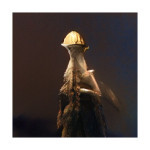
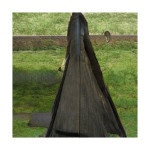
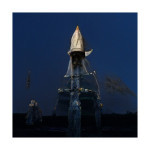
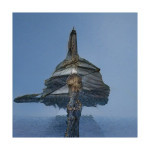
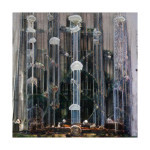
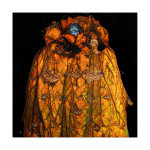
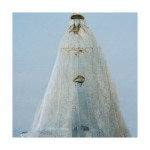


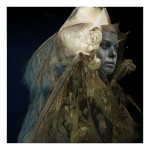

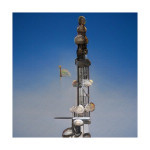
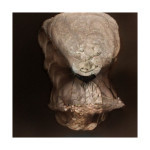
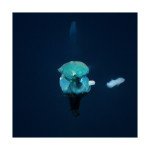
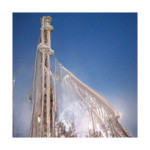
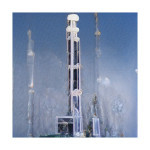
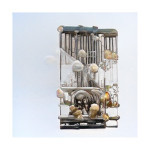

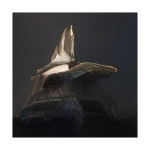

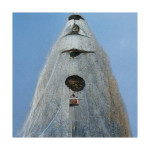

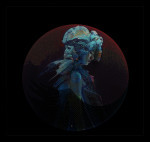


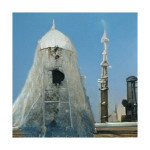
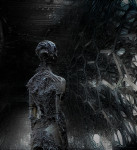


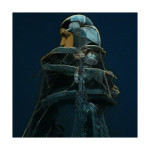
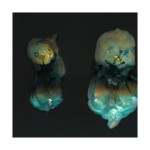
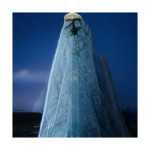


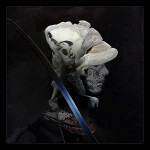





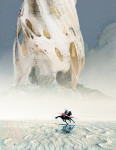

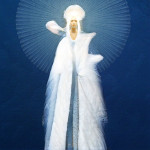

September 23, 2019
Art by Tomiyuki Kaneko inspired by the classical Buddh...
[image error]
Art by Tomiyuki Kaneko inspired by the classical Buddhist tradition in Japan.
I am sitting in an Italian cafe across from the US Embassy in Tokyo waiting for Orine to finish her visa interview.



